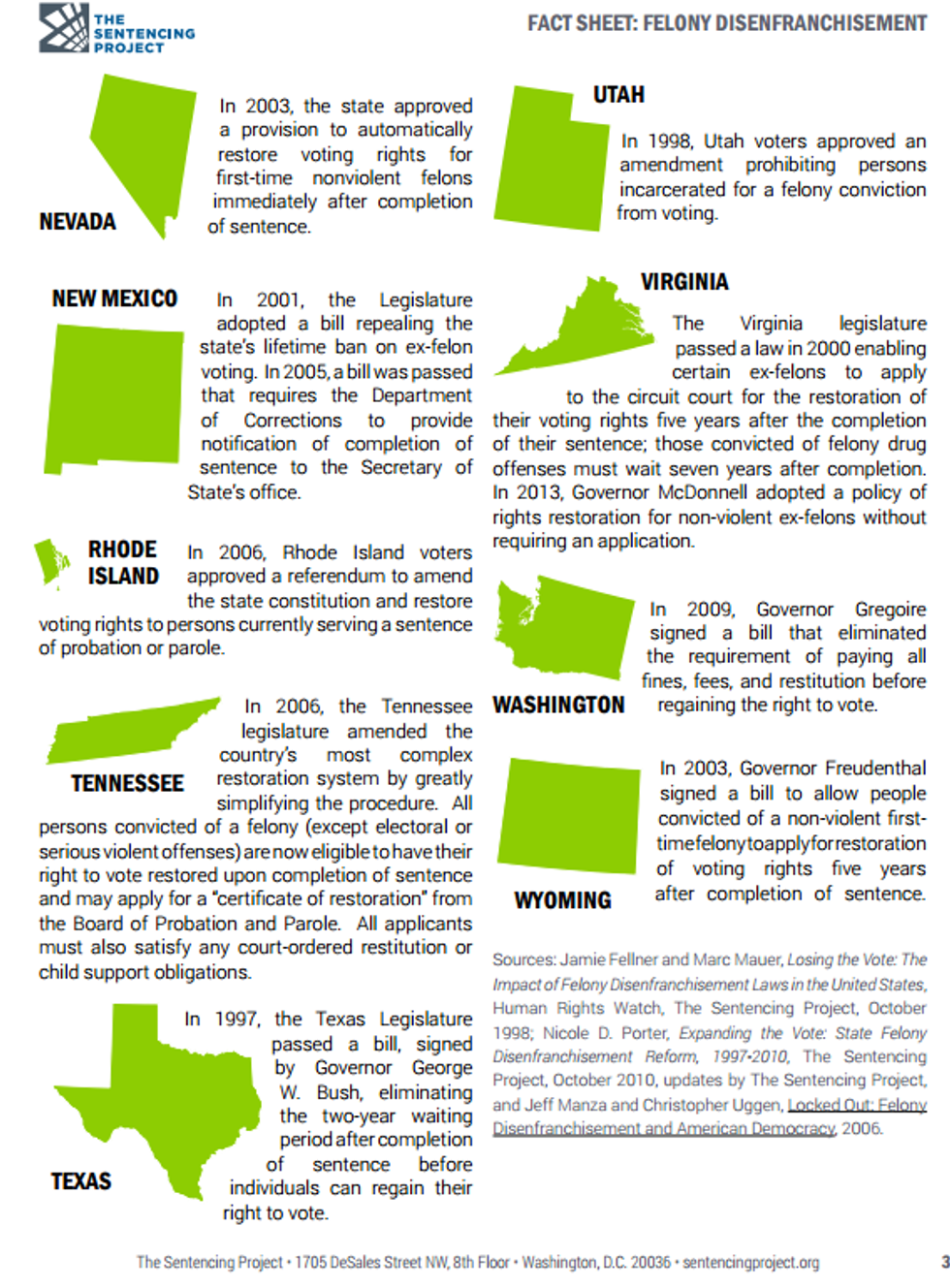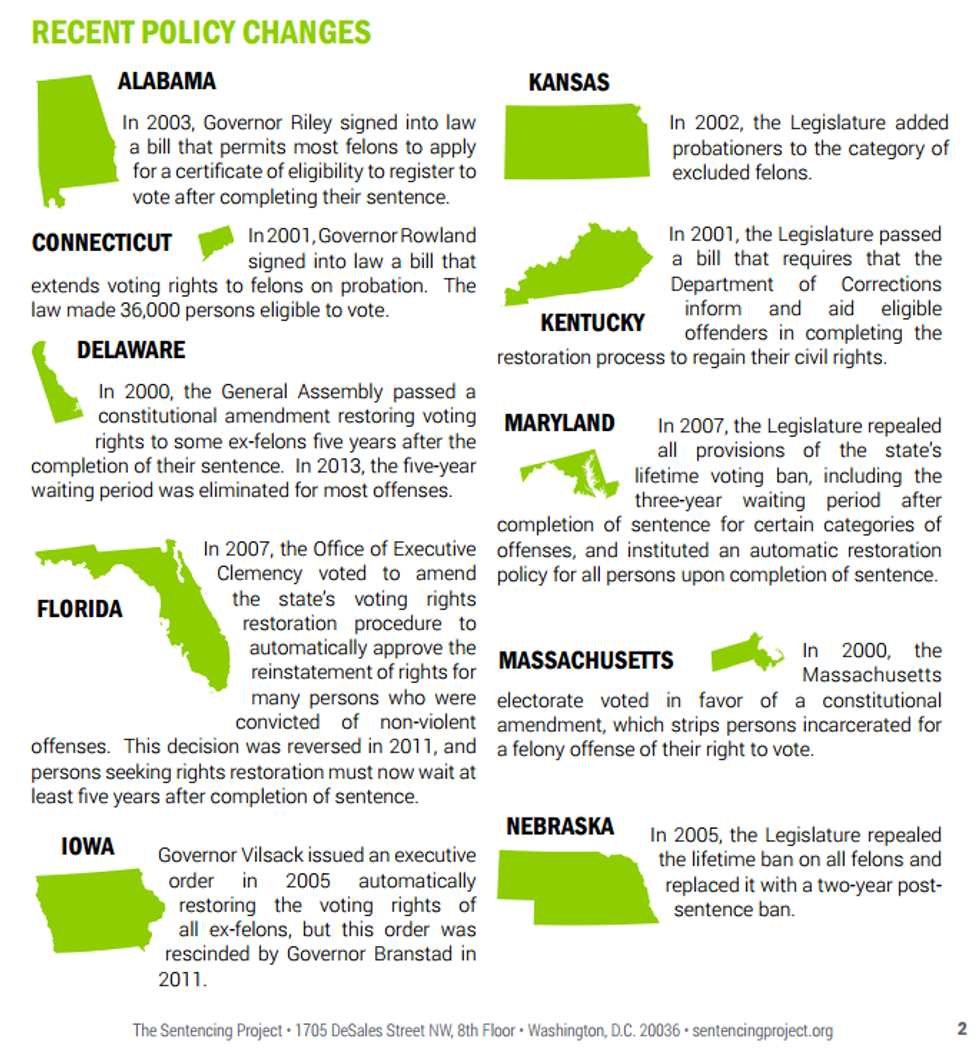I began to learn about voting rights when I was a senior in my high school civics class. We learned that people who are excluded from voting go all the way back to the beginning, where the only people allowed to vote were white property owners. After white men who didn't own property were able to vote, a slow avalanche began to fall. More and more people wanted to exercise their rights. African-Americans, women, and poor people are among some of the most brought up marginalized groups who fought and won their right to vote; but what about America's felons?
According to the National Conference of State Legislatures (NCSL), ever since the ancient times of Greece and Rome, revoking criminals’ right to vote has been standard practice. “Civil death”, a method often used in Europe, involved taking away a criminal’s property, forfeiting their representation in court, forbidding them to enter into contracts and their ability to vote. Civil death originated from English colonists in the U.S, and was eventually abolished; felon disenfranchisement still remains in some parts of 21st century America.
Currently, 5.8 million American citizens are unable to vote in this year's election. 2.2 million of those people are African-Americans; 1 in 13 adults who are of color cannot vote. That is 7.7%. The rates for individual states are even higher, with Florida at 23%, Kentucky at 22% and Virginia at 20%; 3 in every 10 of these black men can be expected to be disenfranchised in their lifetime.
Throughout the 50 states, felon disenfranchisement is approached differently. Maine and Vermont never revoke their criminals’ voting rights, however, Florida, Iowa and Virginia permanently take away felon and ex-felons ability to vote.
An infographic from The Sentencing Project lays it out here:
Phil Sheets, an 18-year-old multidisciplinary major here at WVU, sat down with me at lunch, per my request, and talked to me about his thoughts on this issue. He has lived in both Virginia and West Virginia, and was really familiar with a lot of the policies. "Well...I can tell you they can’t vote while they’re incarcerated, from what I know. My dad is able to get his voting rights restored, but he has to go through a process, it’s not automatic. " he told me over egg rolls and rice from the Boreman Bistro.
"We, as a nation, have the largest number of incarcerated people among the developed world...Incarcerated people make mistakes and go into prison; this does not mean they are incapable of making these decisions. Perhaps violent crimes, no. Non-violent felonies should be exempt. My dad hasn’t been able to vote since 2004. He wasn’t allowed to vote on probation, either." Phil's father is currently a resident in Virginia. "They get fucked by the system and can’t do anything about it."
I asked another friend of mine, Jacob "Jake" Beck, to come with us as well. Jake is 18, and a journalism major. He's from Pennsylvania, whose current prisoners are not allowed to vote. "They still live here, they’re still like, incarcerated" Jake said white he sat next to me, "...but that doesn’t mean you can take away their rights. I believe that voting is an unalienable right, everyone deserves to vote."
Later on, my friend Cameron "Cam" Crews came into the Bistro with us for Jazz Night. There was an open coffee bar, a music major playing violin, and pepperoni rolls and lava cakes galore. Cam, just like Phil, Jake and I, is pretty into politics and equality; I decided to ask him some questions, as well.
I asked him how he would feel as an inmate, unable to vote. His reply was "I would feel unequal, and like I’m being cheated because I’ve already been sentenced and punished for my crime and I’ve had to spend the time. Now that I’m out I’m trying to start fresh, I’m not even able to have access to the ability to have my own voice in the government."
I was pretty excited about the responses I was receiving, and had a few other friends interested in sharing their opinions on the topic. My fellow education major friend, Anna Smith, is 20, and is a native of Morgantown. I emailed her the questions I asked Jake, Cam and Phil.
"I’m honestly not sure about how I feel about it" Anna wrote to me, "I suppose that I don’t totally agree with it – I think that felons are still citizens who deserve to perform a public duty, and they have the right to their opinion just as everyone else does. But, on the other hand, I don’t think that people who are capable of good decision making should be able to vote, BUT, I also understand that our prison system is flawed and that a lot of people actually need to seek mental help rather than incarceration… I DO think that people who have served their time have the right to continue their lives normally, which includes having the right to vote. If someone has served their time, they should be able to vote."
Another friend of mine, Jessica Dobrinsky, was incredibly interested in this subject and feels very strongly about it. She reached out to me and asked me to send her the questions as well. Considering she is a poli-sci major and is also interning for a politician, I felt as if her opinion could really add to the article I had in mind.
"I don’t feel like criminals should have the same voting right as me because I follow the law and respect the regulations of this country. I’ve done my part to contribute to society and followed the law so I have earned my privilege to keep my rights if you cannot do this then you do not deserve these privileges." Jess told me in her response. "While I do support in the legalization of marijuana and find that it is a crime that costs too much money to incarcerate people for, it is still a law and if you are arrested for possession or distribution you should face the same consequences as anyone else who chooses to break the law. Just because you don’t agree with a particular law doesn’t mean that you have the right to or some sort of excuse to break it. There are plenty of laws I disagree with but as a US citizen I must follow them and because of this, I am subject to face any consequence for breaking these laws."
I asked Jess about her view on the process of re-registering to vote. She told me "I believe it is fair but there also must be improvement within the system for this process. It’s known to be difficult due to the poor communication between parties trying to approve this voting registration. Staffing is low in these agencies as well allowing applications to pile up."
To add more context to this article, I wanted to reach out to prisoners/former felons to see how they felt. Unfortunately, the process can take an incredibly long time; with the answers I had from my peers, I felt as if I had more than enough to send a message to readers of The Odyssey.
Want to learn more about felon disenfranchisement? Check out these resources:
http://www.sentencingproject.org
http://www.ncsl.org/research/elections-and-campaigns/felon-voting-rights.aspx
Sources:
"Felon Voting Rights." National Conference of State Legislatures. N.p., 29 Sept. 2016. Web. 10 Oct. 2016.
"The Sentencing Project." The Sentencing Project. N.p., n.d. Web. 12 Oct. 2016.














































